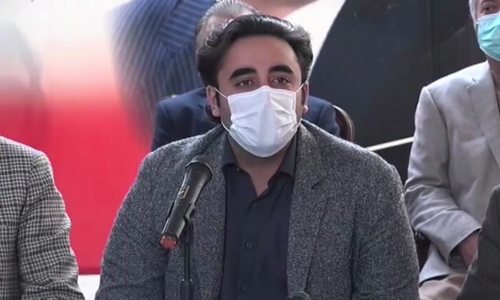PRESIDENT Arif Alvi has issued an ordinance for holding the upcoming Senate elections through an open vote by amending the Election Act 2017. The ordinance says: “Provided that in case the Supreme Court … gives an opinion … that elections for members of Senate do not fall within the purview of Article 226 of the Constitution, the poll for elections for members of the Senate … shall be conducted … through open and identifiable ballot.”
The government took the decision to issue an ordinance after the opposition blocked a bill tabled in the National Assembly to amend the Constitution and change the existing mode of secret balloting in the election for the upper house. Legal experts will have to determine if the change in this act would suffice for open balloting to take place or whether a constitutional amendment will actually be needed for the purpose.
Linked to all those is a larger question about why the government has been insistent on bulldozing through such a change in the mode of voting for elections that are just weeks away. There is no arguing that the menace of vote-purchasing in the Senate elections must be done away with. The government has framed its initiative in a way that suggests that the only reason the opposition is not agreeing to such a change in the voting method at this time is because it wants corruption to flourish in these elections. Such a line of reasoning may make sense to the PTI base but it excludes the larger argument.
Any constitutional amendment aimed at fixing existing problems in the system, or improving processes that in turn strengthen democracy, must be discussed and debated at length with the aim of reaching a consensus. The government has done no such thing. Instead, it has painted the issue in partisan colours with the obvious aim of discrediting the opposition. Either this, or the government is concerned that it may lose some of its own members’ votes in the secret ballot for the Senate elections. Both reasons fall far short of the moral high ground that the government is attempting to gain on this issue.
A better way would be to make this change part of a larger set of electoral reforms that are in any case overdue and required. It is high time that the government and the opposition agreed to start processing such reform work in the house committees with the intention of drafting a comprehensive bill that fixes all weaknesses in the electoral system. All stakeholders should be taken on board and the bill passed through a consensus so that everyone takes ownership of it and ensures that it is implemented in letter and spirit for the next general elections. By making it a political dispute, the government is needlessly complicating an issue that requires utmost seriousness of purpose. It should reconsider its position.
Published in Dawn, February 7th, 2021













































